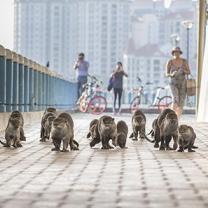Wild Metropolis
Wild Metropolis

-
Premiered:
- Network: PBS
- Category: Series
- Genre: Documentary
- Type: Live Action
- Concept:
- Subject Matter: Nature
- Tags:
Plot Synopsis
Narrated by Graham Vick, WILD METROPOLIS is a three-part documentary series that reveals the world's most extraordinary wildlife living in the newest and fastest changing habitat on the planet: cities. This three parter features a diverse cast of animals that are adjusting to this new world better than we could have predicted, not only applying their natural-born skills and abilities to life in the city, but also making amazing physical or behavioral adaptations. From humpback whales breaching against New York's skyline, to penguins nesting in Cape Town, explore our most-loved and familiar cities through the eyes of the animals that live in them, and discover a wilder side to a world we think we know. The three episodes include:
"Resident" (Wednesday, October 2, 2019 at 10pm): The world's cities are growing at a faster rate than any other habitat on the planet. While most of us imagine them to be concrete jungles devoid of nature, for animals of all shapes and sizes, they are just a new habitat filled with opportunity. With similar needs to humans, these wild animals face challenges, and like us, if they play their cards right, animals can find everything they need in the city. If we're willing to accept wildlife as a neighbor, and even to help animals get a foothold in the city, the rewards can be huge for them and for us. With the natural world shrinking, and our urban centers continuing to grow, adapting to life in the city has never been more important. This episode examines what makes a city a good habitat for an animal to live in, and what it takes for these wild residents to thrive in the newest and fastest-changing habitat on the planet. See how smooth-coated otters have made a home in Singapore and huge colonies of mega-bats in Adelaide. Reticulated pythons can be seen flourishing in the streets of Bangkok.
"Commuters" (Wednesday, October 9, 2019 at 10pm): More than a billion people around the world commute into cities each day, traveling in to take advantage of the riches on offer, and they are not alone. The world's wildlife is commuting too. A steady flow of animals journey into and out of cities in search of vital elements missing from their wild lives. Leaving the wilderness, they must overcome the unique challenges that the urban world throws at them to benefit from the urban spoils. This episode explores whether the secret to an animal's success in this fast-changing world is to keep one foot in the wild and one in the city, becoming a wild commuter. It seems that all over the world, animals are finding that the city can offer opportunities that are harder to come by in the natural world. African penguins have found by nesting in the city, they are safer from predators. Some wild commuters travel to cities to feed on what grows in them; others, like black bears, are more interested in what we throw away. The urban world has created opportunities that are too good to ignore for some of the world's wildlife. Many animals displaced from their natural habitat are now using their wild skillset in the city to help fulfill their needs. This fast-paced and thoroughly enjoyable program considers whether this could be the beginning of a new and very modern migration.
"Survivors" (Wednesday, October 16, 2019 at 10pm): In the last 30 years, the world's urban areas have almost tripled in size, changing at a rate wildlife has never experienced before. As cities are built, animals are pushed out of their natural homes. Their stories are the most surprising and captivating of all. Today, these "wild survivors" find themselves fighting for their place in a land that once belonged to them. This episode features elephants in Sri Lanka and see that competition between them and humans for land and resources is resulting in deadly territorial conflicts. On the Pacific coast of Costa Rica, we meet a troop of capuchin monkeys and learn how human behavior is affecting them while also raising big questions about their future. We also see how relationships between human and animals can be mutually beneficial. For example, in Amsterdam, we meet a heron called Kiri who's been visiting the same house twice a day for the last 17 years and befriended its owner. In Florida, the manatee population has recovered to such an extent under the guardianship of local human residents that, in recent years, they have been taken off the endangered species list and contributed to a massive boom in the local tourism industry. We also meet the swiftlets who have evolved to live only in peoples' houses and specially built swiftlet hotels in Indonesia. And cameras reveal the surprising story of a population of tiny foxes on a Californian island whose presence benefits the hardened military personnel of a US Naval Base. This hopeful but realistic episode culminates with the return of charismatic ocean giants to the world's most iconic city, as humpback whales breach against the New York skyline.
Cast
- Graham Vick - Narrator

